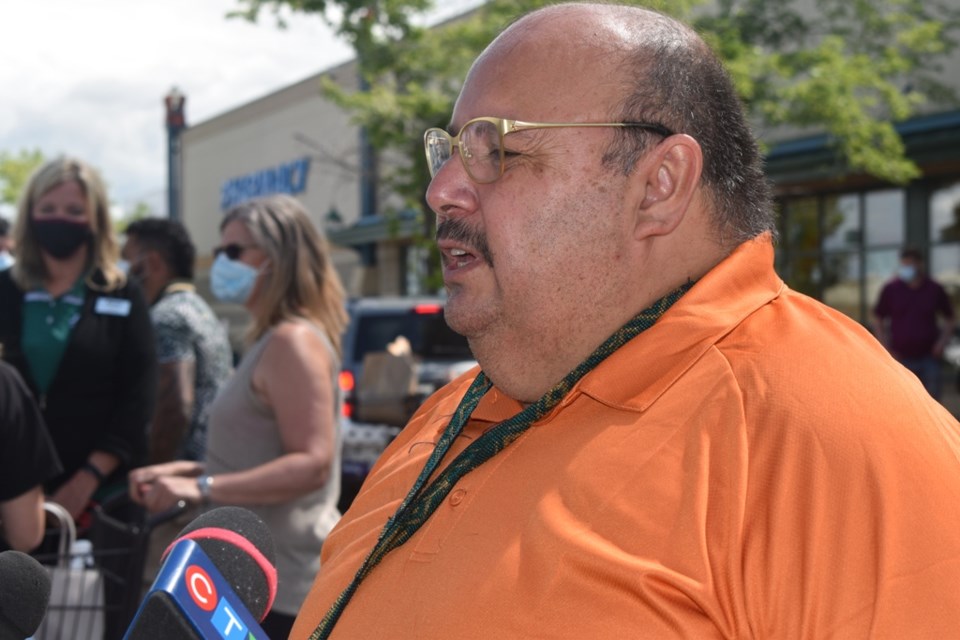It was officially a celebration of the ingenuity of Indigenous peoples in coming up with locally produced cleaning kits to help keep communities safe from the onslaught of the COVID-19 pandemic. It was overshadowed, however, by developments within the movement to identify graves of children who died while in Canadian residential school.
Following the ceremonies marking the offering for sale of nîkihk cleaning kits at Sobeys Preston Crossing in Saskatoon, Battlefords Agency Tribal Chiefs executive director Neil Sasakamoose told reporters the tribal council is in the process of examining two of five sites identified as possible gravesites — an expected emotional and gruelling project they hope to finish before the end of the summer.
Sasakamoose, BATC Senator Jennifer Spyglass, Federation of Sovereign Indigenous Nations Chief Bobby Cameron, and other chiefs and elders representing the various member First Nations were in attendance during Monday’s launching at Sobeys Preston Crossing of nîkihk cleaning kits, a project of BATC’s Investment Branch that is 100 per cent owned by First Nations in the province. Nîkihk, which means “My Home’ in the Plains Cree language, cleaning products that are being manufactured locally — in collaboration with the tribal council, local manufacturers and the Canadian government — range from hand sanitizers to laundry detergent.
However, more focus was given to moves to locate hundreds of possible unmarked graves of Indigenous children taken from their families and put in residential schools run by the Canadian government and various Christian denomination. The religious congregation of the Missionary Oblates of Mary Immaculate ran the Thunderchild (Delmas/St. Henri) Indian Residential School from 1901 until it burned down in 1948 while the Battleford Industrial School was the first residential school operated by the Canadian government but delegated the responsibility of administration to an Anglican minister.
Sasakamoose said they are scheduled to start on July 17, but they dealing with private landowners.
“[It’s] going to be a difficult site because it’s been on private land. We’re getting ourselves mentally ready to determine what’s going to happen there. We don’t know much. What we did is we started interviewing people, mapping out the entire area.”
“It’s a large area. There is a site there, but we were told there’s people around the school and other places, too. We don’t know how many people are there. We started ground radar there. We built one ground radar and we’re hoping for results. That’s going to be a very difficult site for us.”
He added that even Spyglass, who was the first female senator appointed by the Mosquito First Nation to the BATC and FSIN, is looking for some closure on what happened to her then five-year-old brother who died while attending one of the residential schools.
“She’s been one of our main leads. She’s looking for her brother and she doesn’t know where he is. He’s in one of the five or six sites that have been identified.”
Sasakamoose said once they are done at the Delmas site they would then move to the Battleford Industrial School. They hope to finish both residential school sites either on Aug. 28 or 31. He added they have yet to determine the number of marked or unmarked graves at the Delmas site.’“I have no idea, we don’t. I don’t want to say because we’re doing discovery.”
“I know the [Catholic] church released records of all the students and registries. So, we’re just confirming the registries. The information and data [are] off. We don’t know if deaths were recorded accurately. I don’t want to say they weren’t, but you [must] assume they weren’t recorded accurately. There’s just too many.”
Fulfill promises
The FSIN executive has also called on the Roman Catholic Church to fulfill its promise to give monetary compensation amounting to $25 million to Indigenous survivors of residential schools who were victims of abuse and other crimes committed by priests and nuns. The Catholic church is in the process of raising funds for the money to be given to the victims.
FSIN Chief Bobby Cameron is also asking the pope to issue an apology for the mistreatment received by Indigenous children from the hands of clergymen and other religious.
“Residential school survivors deserve an apology from Pope Francis and compensation for all the extreme harms that occurred in those torturous institutions. We demand the records of these institutions be released immediately and justice be served to every living priest and nun who committed crimes against our innocent children.”
“Acts of genocide occurred at the hands of Catholic Church clergy men and women. Our children that never made it home are now speaking to us; they are crying ‘they found us’ and we will not stop until they receive the justice that they have been waiting decades for. The Church must also follow through with their vows to raise $25 million as once committed for these survivors and their descendants.”
FSIN said they want Pope Francis be true to the word pontiff, which is pontifex in Latin, which means bridge builder. They said apologizing, would be one step in beginning the healing journey for all the victims. They also demanded justice be served to all priests and nuns still living today, members of the clergy that committed “historical harm” and “first degree murder” of First Nations children.
Later this year, a delegation of Indigenous peoples of Canada — First Nations, Metis, and Inuit — is set to meet with Pope Francis in December. The meeting is set for Dec. 17 to 20 where the delegation could foster a meaningful encounter and dialogue with the Holy Father as part of the healing process between the Catholic church and the Indigenous population.




